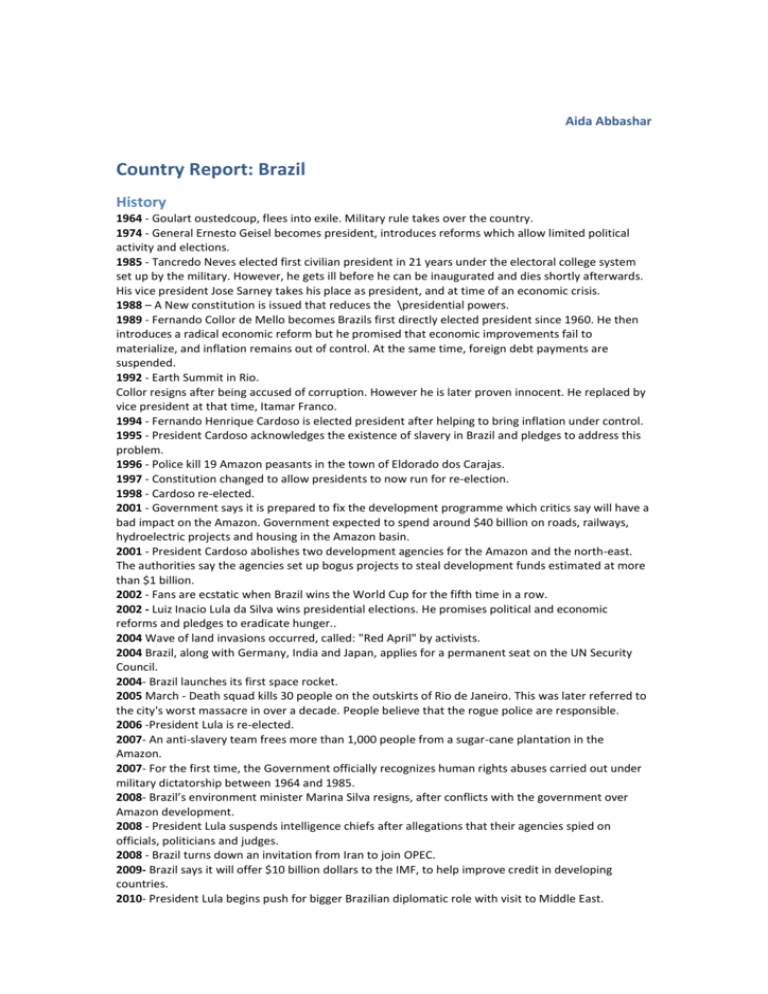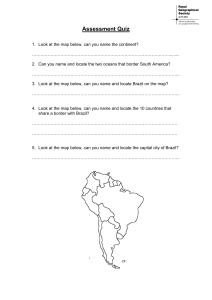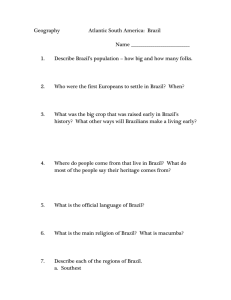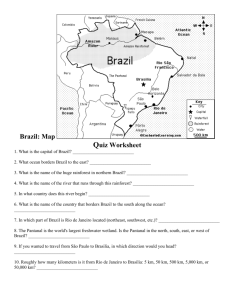Country Report: Brazil
advertisement

Aida Abbashar Country Report: Brazil History 1964 - Goulart oustedcoup, flees into exile. Military rule takes over the country. 1974 - General Ernesto Geisel becomes president, introduces reforms which allow limited political activity and elections. 1985 - Tancredo Neves elected first civilian president in 21 years under the electoral college system set up by the military. However, he gets ill before he can be inaugurated and dies shortly afterwards. His vice president Jose Sarney takes his place as president, and at time of an economic crisis. 1988 – A New constitution is issued that reduces the \presidential powers. 1989 - Fernando Collor de Mello becomes Brazils first directly elected president since 1960. He then introduces a radical economic reform but he promised that economic improvements fail to materialize, and inflation remains out of control. At the same time, foreign debt payments are suspended. 1992 - Earth Summit in Rio. Collor resigns after being accused of corruption. However he is later proven innocent. He replaced by vice president at that time, Itamar Franco. 1994 - Fernando Henrique Cardoso is elected president after helping to bring inflation under control. 1995 - President Cardoso acknowledges the existence of slavery in Brazil and pledges to address this problem. 1996 - Police kill 19 Amazon peasants in the town of Eldorado dos Carajas. 1997 - Constitution changed to allow presidents to now run for re-election. 1998 - Cardoso re-elected. 2001 - Government says it is prepared to fix the development programme which critics say will have a bad impact on the Amazon. Government expected to spend around $40 billion on roads, railways, hydroelectric projects and housing in the Amazon basin. 2001 - President Cardoso abolishes two development agencies for the Amazon and the north-east. The authorities say the agencies set up bogus projects to steal development funds estimated at more than $1 billion. 2002 - Fans are ecstatic when Brazil wins the World Cup for the fifth time in a row. 2002 - Luiz Inacio Lula da Silva wins presidential elections. He promises political and economic reforms and pledges to eradicate hunger.. 2004 Wave of land invasions occurred, called: "Red April" by activists. 2004 Brazil, along with Germany, India and Japan, applies for a permanent seat on the UN Security Council. 2004- Brazil launches its first space rocket. 2005 March - Death squad kills 30 people on the outskirts of Rio de Janeiro. This was later referred to the city's worst massacre in over a decade. People believe that the rogue police are responsible. 2006 -President Lula is re-elected. 2007- An anti-slavery team frees more than 1,000 people from a sugar-cane plantation in the Amazon. 2007- For the first time, the Government officially recognizes human rights abuses carried out under military dictatorship between 1964 and 1985. 2008- Brazil’s environment minister Marina Silva resigns, after conflicts with the government over Amazon development. 2008 - President Lula suspends intelligence chiefs after allegations that their agencies spied on officials, politicians and judges. 2008 - Brazil turns down an invitation from Iran to join OPEC. 2009- Brazil says it will offer $10 billion dollars to the IMF, to help improve credit in developing countries. 2010- President Lula begins push for bigger Brazilian diplomatic role with visit to Middle East. 2010- Brazil gives its approval for construction of a hydroelectric dam in the Amazon rainforest. It is expected to be the world's third largest. 2010 - Dilma Rousseff is elected Brazil’s first female president. 2011- Chamber of Deputies vote to calm restrictions on the amount of land farmers must preserve as forest. This raises fears of further deforestation in the Amazon. 2011- President Rousseff's chief of staff resigns due to corruption allegations. 2011- Government launches Brasil Sem Miseria (Brazil Without Poverty). A welfare scheme that is aimed at helping millions people who are experiencing extreme poverty. 2011- Brazil's Congress votes to set up a commission to investigate rights abuses. Political Structure Main Points of the Constitution: Ensures social and individual rights Ensures liberty Ensures security Ensures well being Ensures development Ensures equality and justice The constitution also underlines the sovereignty, citizenship and the dignity of the individual The Brazilian constitution is the foundation and source of the legal authority It also underlines the existence of Brazil and the federal government of Brazil. Governmental Structure: President: Dilma Rousseff (since 1 January 2011) Vice President: Michel Temer (since 1 January 2011) (Both Presidents and Vice Presidents are chiefs of state and heads of cabinet) Cabinet is appointed by the President Elections: president and vice president elected at the same time by popular vote for a single four-year term Legislative Branch: National Congress consists of the Federal Senate (81 seats; 3 members from each state and federal district elected according to the majority to serve eight-year terms) and the Chamber of Deputies (513 seats; members are elected by proportional representation to serve four-year terms) Supreme Federal Tribunal consists of 11 ministers that are appointed for life by the president and confirmed by the Senate and the Higher Tribunal of Justice where judges are appointed for life. Economy Basic commodities produced coffee, soybeans, wheat, rice, corn, sugarcane, cocoa, citrus; beef, textiles, shoes, chemicals, cement, lumber, iron ore, tin, steel, aircraft, motor vehicles and parts, other machinery and equipment Trade agreements WTO agreements MERCOSUR agreements Dependency and debt Their external debt is $396.2 billion as of June 30th 2011. Memberships of economic and trade organizations WTO MERCOSUR Trading partners, allies, and enemies China, US, Argentina, Netherlands, Germany and South Korea. Views on World problems and Conflicts Role and influence in the world Brazil is by far the most populous and largest country in South America. It is a truly democratic state. Brazil is constantly pursuing industrial and agricultural growth. Today, Brazil is South America’s leading economic power and a regional leader. Brazil is known for its exports and resources. It is one of the rising economic powers. Also known as BRIC (along with Russia, India and China) Over the past few years it has made major efforts to help millions of impoverished people. The discovery of offshore oil reserves could turn Brazil into one of the top oilexporting nations. Membership of blocs and geo-political groupings African Development Bank Group (AfDB) Agency for the Prohibition of Nuclear Weapons in Latin America and the Caribbean (OPANAL) Food and Agriculture Organization (FAO) International Atomic Energy Agency (IAEA) International Chamber of Commerce (ICC) International Criminal Court (ICCt) International Finance Corporation (IFC) International Fun for Agricultural Development (IFAD) International Labor Organization (ILO) International Monetary Fund (IMF) Allies and enemies Allies: India, South Africa, Argentina, US, China, Netherlands, Germany, South Korea, Portugal, Spain. Geography Geo-political region and surrounding conflicts: Deforestation in the Amazon Problems include crime and violence in Colombia, Brazil, Puerto Rico and Venezuela. Drug abuse HIV/AIDS Issue: Human Rights in Nonviolent Protests and demonstrations Nonviolent acts of protest are actions performed by a group of people to show their support or disapproval of something. These people protest with one common goal: to bring public awareness to an issue, persuade or influence a particular group of people. Their messages are directed to the public; people whom this issue usually affects. Protesters take to the streets sharing techniques of civil resistance, such as strikes, demonstrations, marches and rallies, and the use of social media such as Facebook and Twitter. The Federative Republic of Brazil supports the efforts of peaceful protesters and condemns the violent crackdowns of the governments. In 2011, Brazilians held peaceful anti-corruption demonstrations, as the country marked its Independence Day. These protests were completely protesters and our government did not attempt to stop these protesters’ symbolic gesture to wash away corruption. But when these peaceful demonstrations lead to violent responses from authorities, that is when violating human rights can become an issue. Nonviolent resistance advocates such as Ghandi and Martin Luther King Junior used nonviolence to address issues that were bothering them, and most recently, the Arab World has been experiencing a revolutionary wave of peaceful protests and demonstrations, striving to achieve a truly democratic government. However, some of these protests have received negative responses from authorities and some governments have been issuing a violent crackdown on civilians, which violates human rights. Operative Clause: 1) Calls upon all Member States, working together and acting in cooperation with the Secretary General, to facilitate and support the return of humanitarian agencies and make available humanitarian and related assistance to the Syrian Arab Republic and requests the States concerned to keep the Security Council regularly informed on the progress of actions undertaken and expresses the readiness to consider taking appropriate measures, as necessary, to achieve this. Issue: The treatment of illegal immigrants in MEDC’s Illegal immigration is the migration of people into a nation in violation of immigration laws. Illegal immigration can raise many political, economical and social issues in developed and successful developing countries. Brazil has long been part of international migration routes; but unauthorized immigrants in Brazil enjoy the same legal privileges as native Brazilians, such as social services like public education and the Brazilian public healthcare system. Brazil believes that repression and intolerance of immigrants will not solve the problems caused by the economic crisis . However, in other MEDC’s such as the United States or France, have deported their immigrants. Saudi Arabia started construction of a separation barrier between its territory and Yemen to prevent any unauthorized movement of people. Operative Clause: 1. Calls upon governments of all member states to urge countries to sign or accede to the 1951 UN Refugee Convention which is the key legal document in defining who is a refugee or asylum seeker, their rights and the legal obligations of states and therefore reinforce the immigration of all people who enter new borders of nations, decreasing the amount of illegal immigrants by means such as not limited to: a. ensuring that refugees are treated according to internationally recognized standards of law, b. making certain that refugees are granted asylum fairly and are not forcibly returned to the countries from which they fled or are at risk, c. promoting appropriate procedures in determining whether or not a person is a refugee or asylum seeker according to the 1951 Refugee Convention;





